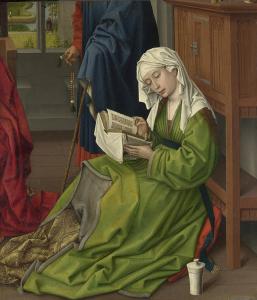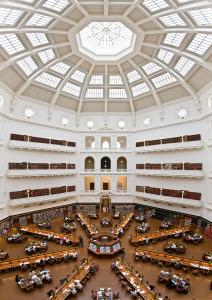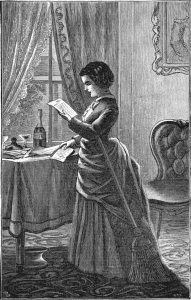 I used to get paid to read books, or at least that is how I often replied to those who asked me what I did for a living as a university professor. In those days, now over for almost 8 years, I would ensconce myself in my lovely office, sit calmly behind my commodious desk, open a tome, large or small, written in one language or another, and wile the day away, absorbed in the intricacies of history, or the complexities of one verb system or another, or the beauties of the art of literature. Of course, on certain days, I had to interrupt my pleasant forays into these inviting realms to exit my room and teach a class or attend a meeting or attempt to write my own additions to the scholarly canon. I absolutely loved my life as scholar, but I suppose I most miss those languid and uninterrupted days of reading.
I used to get paid to read books, or at least that is how I often replied to those who asked me what I did for a living as a university professor. In those days, now over for almost 8 years, I would ensconce myself in my lovely office, sit calmly behind my commodious desk, open a tome, large or small, written in one language or another, and wile the day away, absorbed in the intricacies of history, or the complexities of one verb system or another, or the beauties of the art of literature. Of course, on certain days, I had to interrupt my pleasant forays into these inviting realms to exit my room and teach a class or attend a meeting or attempt to write my own additions to the scholarly canon. I absolutely loved my life as scholar, but I suppose I most miss those languid and uninterrupted days of reading.
Obviously, not all of those items I read were equally satisfying. I remember all too well those long ago times when I was trying to ramp up my acquaintance with the literature of homiletics, since I had been asked to teach that subject, beginning in 1984, having been trained in the wonders of the Hebrew Bible. In those days, homiletical literature was in the main a dry desert of repeated attempts to say the same things over and over concerning the various ways one might structure and deliver a sermon. There were, fortunately, a few books that started to break away from that straight jacket of interests, but far too few to make my reading more stimulating rather than a slog through the repetitious mire. I trust that does not too cruel or arrogant; I have no wish to impugn the honest attempts of those who sought diligently to help preachers be better at their craft, but after delving for some years into the rich soil of Hebrew Bible studies, I found the ground of homiletics in the main stony and unyielding. I very soon discovered that I could bring my Hebrew Bible interest into my new field, a find that made my scholarly life once again delightfully fulfilling. And so it was for the final 28 years of that life.
Well, what does a scholar read in retirement? When I retired, I gave away about 3500 of my books, primarily to foreign seminary libraries, imagining that an African student, not having the free access that I had to such books, would find in one of mine some helps for her own ministry in a place I would never experience. I admit to feeling that such a gift was appropriate; I had done what I could with those tools of my trade, and thought that the tools could now be employed in other places by other faithful persons, pursuing the ministry of God. I kept a few of the books I imagined would not be so readily available: The Anchor Bible Dictionary, a few of whose articles I had written, giving me a significant price break on its hefty cost; the The Theological Dictionary of the Old Testament, a rather controversial 14 volumes, but which I had long found quite useful when used carefully; my trusty BDB Hebrew Lexicon, that I had bought now 52 years before, my companion BAG Greek Lexicon; the ancient GKC Hebrew grammar (I will not bore you with the full names behind those letters; those of you who know them, know them already, and those who do not will not be interested); various commentaries on a biblical book or two, with several on the Book of Job, a special favorite book of mine that I return to regularly. And that is about it; those first followed me home in Dallas and now on to California.
No, I do not quietly sit in my retirement and peruse the Hebrew Dictionary, though I have been known still to ponder its wonders on a disputed word or two. What I find myself reading now is a veritable eclectic panoply of books that covers any number of genres. Let me describe a few of them to you. I love a good mystery, and I also love the study of history. When the two loves are spliced together, I especially enjoy the joined results. Because I am particularly attracted to the period of English history just before and after the reigns of Henry VIII and Elizabeth I, that period that birthed the greatest genius of the English language, William Shakespeare, I completely enjoy books that know that history well enough to plot a mystery using that background to enrich the fun. There is any number of suggestions I would make in this genre.
By far outstripping them all is the magisterial three-volume wonder by Hillary Mantel that concerns the life and death of that surprising figure, Thomas Cromwell, butcher/blacksmith’s son, and finally chief advisor to the mercurial Henry VIII; his spectacular rise to power and terrible fall to the axman’s block is told brilliantly and movingly by Mantel in some 1500 well-wrought pages. I can hardly recommend these books too highly; if historical fiction is your bag, grab these immediately. For a rather more murderous turn, read SJ Parris’s wonderful volumes, featuring the real character, Giordano Bruno, who in Parris’s hands becomes a very clever solver of crime in England, just before the turn of the 17th century. Bruno, the historical philosopher and radical believer, was burned at the stake in 1600, but he is crime fighter extraordinaire in these novels. Parris, nom de plume of the journalist Stephanie Merritt, has thought deeply about this period of history, and about the man Bruno, finding in him a kind of model for the riven religious times in which she now lives in a divided Europe.
Read also the fine books by CJ Sansom, seven volumes of Tudor mysteries, employing the unforgettable character of Matthew Shardlake, a hunchback lawyer, who solves intricate crimes about the same period as the time of Thomas Cromwell. In fact in the first two of the series it is Cromwell who hires Shardlake for help on a case. There are seven of these excellent mysteries, but unfortunately they will be the last, since Sansom apparently has a terrible cancer. I have just discovered another series that I am now reading by Phillip Gooden, some seven volumes that use a different Shakespeare play as backdrop for the crimes. The main character is Nick Revill, a refugee from a plague- ravished village, who heads for London to try to make it as an actor. He joins the Lord Chamberlain’s Men, the company most associated with the actor/playwright Shakespeare. For me, this series combines the Tudor period with mystery and the plays of Shakespeare; what a glorious combination!
I have also read all of the translated mysteries of Oliver Poetsch, who has written the fascinating series all based on his very distant relative, the hangman of Schongau. I am sorry my German is not quite good enough to get to these in his language, but the translations of the seven volumes offer clever mysteries against the backdrop of Germany in the late Middle Ages and its gruesome culture of hangmen, necessary figures in those long ago days. Poetsch has just turned 50, so we can happily expect more of these thrillers in the future. I should hold up, too, the large historical fictions of Margaret George, whose grand Henry VIII was delightful when I read it some years ago. I have also plunged into her Cleopatra, her Elizabeth I, and now am reading her two-volume work on Nero. She works hard at her chosen age, writes with clarity and force, and plainly enjoys the work she then offers to us.
Let me make one more suggestion, a rather more modern series of mysteries, set in the Weimar period of 20th century Germany, just before the rise of the Nazis. These are the several volumes of the Babylon Berlin series, by Volker Kutscher. His detective is the estimable Gereon Rath, and he must work in the complex and degenerate Berlin of the 1930’s when the Nazis, Communists, and shrinking lovers of freedom vied for places of living. Since we all know too well what happened, the history provides a sober reality to the series. The mysteries are especially good. (I began to watch the series on Netflix based on the books and filmed in Germany, but I found the dubbed English very offputting!).
Between these deep dives into historical mysteries, I have read large biographies—another favorite genre—of Gustav Mahler, Adolf Hitler, Sergei Rachmaninoff, Beethoven, Edwin and John Wilkes Booth, among others. Is there any real rhyme to this diverse reading? I admit to no plan, no special goal, no traceable movement from this to that. As a retired man, I read what I want, when I want, and am thus answerable to no one in my choices. Still, because I remain a scholar of the Bible primarily, each of these choices resonates somehow with biblical themes that have worked within me for 5 decades: the desire for order in chaos, the fascination with human evil and divine good, the love of complexity and paradox, the hope for and belief in a positive end. All these and more direct my choices of reading, and I feel a special privilege to make such choices. I am healthy, I have time, and I can indulge these passions at my leisure. So, I write in the morning and read in the afternoon. I am a happy man! I wish for each of you such joy in your living, even during these difficult and trying days. Reading can make the days rich and rare, and I hope you are finding regular time to do so, whatever your chosen genre may be.
(Images from Wikimedia Commons)











